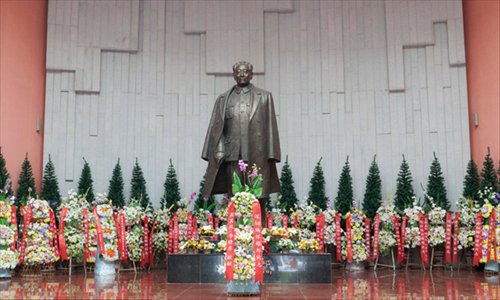Reform follows Hu Yaobang’s vision: experts

Photo: sohu.com
Related report: Tribute to Hu veils value differences
The direction of China's current reform is consistent with the notion of late Party chief Hu Yaobang, said political analysts on the 25th anniversary of the death of the reformist leader, which fell Tuesday.
Hu was elected as general secretary of the Communist Party of China (CPC) Central Committee in February 1980, and he resigned in 1987. He died on April 15, 1989 at the age of 74.
On Tuesday, Net users posted online messages of tribute hailing his push for reform and for building a clean government.
Hu and his successors initiated the country's most inspiring and impassioned reform in the 1980s, Wang Fuchong, an economist, wrote on his Sina Weibo account on Tuesday. "He showed extreme hatred of corruption within the Party, and he replied in person to 3,000 letters from citizens in six years," said Wang.
There was no memorial held at central government-level this year. But officials in Liuyang, Hunan Province, Hu's hometown, visited the late leader's former residence last week in a bid to learn from Hu's "man of the people" work style, the Liuyang Daily reported.
In a low profile visit, Hu Jintao, former general secretary of the CPC Central Committee, went to the residence on Friday, reported the Hong Kong-based Wen Wei Po paper. He reportedly stayed an hour at the residence and bowed to a bronze statue of the late leader.
The most prominent commemoration for Hu was a celebration of the 90th anniversary of his birth held by the central authority in 2005. The conference was attended by then premier Wen Jiabao.
Hu was hailed as a "long-tested and loyal Communist fighter, a great proletarian revolutionist and politician" by the central authority. The commemoration also called on Party members to learn from Hu's merits and his dedication to reform.
Later on, Wen also authored articles in memory of Hu's contributions, which is consistent with the official appraisal of the late leader in 2005.
Last April, Jiefang Daily, the newspaper run by the CPC Shanghai Municipal Committee, published articles hailing Hu's achievements in pushing reform and democracy on the 24th anniversary of his death.
Political observers said Hu has a very good reputation among the public for his selfless behavior and his prioritization of the Party and the people's interests. Tributes paid to him reflect the public's anticipation of reform and the building of a clean government, which Hu had heralded during his time in office.
In addition to tributes to Hu, some Net users used the opportunity to vent their emotions toward social problems and express their own appeals.
However, analysts noted that the current government is in fact sticking to the path of reform advocated by Hu in the 1980s in the new historical context.
The ongoing comprehensively deepening reform was pushed forward with notions consistent with Hu's, said Wang Zhanyang, a professor with the Central Institute of Socialism.
Comprehensive reform is what Hu advocated and the notion was clearly highlighted in the reform package, Wang noted.
After the Third Plenary Session of the 18th CPC Central Committee last November, the central leadership launched a comprehensive reform package involving various issues including the market economy, function of government and legal construction.
"The current reform is on the right track of pushing mental liberation and a market economy, which emphasizes the respect for rationality instead of stubbornly sticking to the struggle over ideology," said Huang Weiping, director of the Contemporary Chinese Politics Research Institute at Shenzhen University.